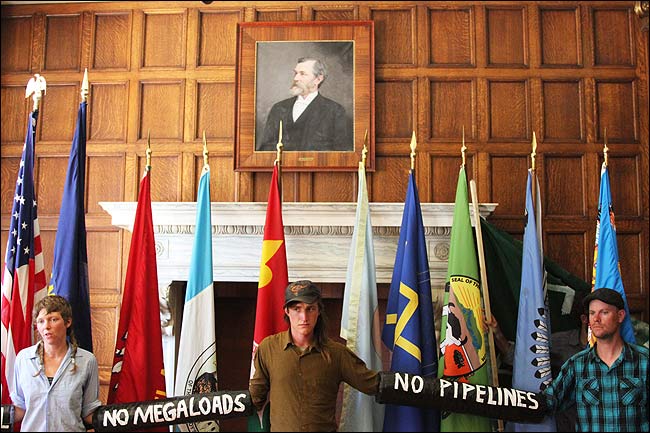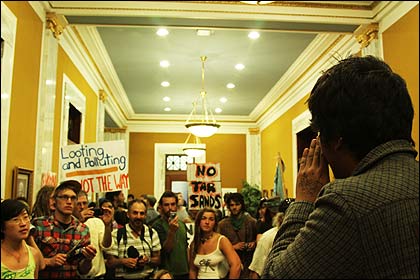
 |
| Erica Dossa of Bozeman, MT, Peter Dolan of Great Falls, MT and an unnamed activist locked together with three others to protest Big Oil at the governors office on July 12. Photo by Murphy Woodhouse. |
Protest Rules
Cascadians protest Big Oil in Montana
by Camilla Mortensen
The last night of the Earth First! 2011 Round River Rendezvous was one of the quietest nights of the almost weeklong gathering. EF!ers, members of Rising Tide and other environmental activists slept at their campsites in the Lolo National Forest, awaiting a 5 am wake-up call for an action against Big Oil that would use chants, signs and “sleeping dragons.”
Where, when and what that action would be was known to only some of the actions organizers that morning. In the end, Johannes Pedersen of Eugene was one of the six protesters to lock himself in front of the Montana governors office in Helena, and he was one of five arrested during the protest.
The Rendezvous, aka the Rondy, took place in Montana but drew about 250 people from Oregon and across the U.S., and from as far away as Spain and Australia. The 20 or so Cascadians ã activists from the Pacific Northwest bioregion ã were a strong presence at the gathering. Pedersen said the 2009 EF! Rondy in Oregons Elliot State Forest was “a clarion call for forest defenders to start being more active in the Northwest again.”
Climate change and destructive fossil fuel extraction, along with logging, dont affect just one state. “The tar sands are a county, state, regional, countrywide and international issue,” said Emma Bea of Rising Ride North America.
“The Silvertip Pipeline spill is a precursor of what is to come,” said Northern Rockies Rising Tides Max Granger of the dangers of new oil pipelines and massive loads of oil extraction equipment coming to Montana.
After days of workshops and training sessions, participants knew the action would target the tar sands route and Big Oil. They knew about fossil fuel extraction from fracking to coal. They knew their legal rights and how to practice civil disobedience and direct action as safely and ethically as possible.
The last day of the Rendezvous was spent in training for some, and for others in making signs and banners and laying out strategy. “Good things come out of the Rondy,” said Bea. “It BRING’s us all together, and its a place where a lot of strategizing happens.”
 |
| Adrian Guerrero of Rising Tide and Earth First! tells the crowd the tar sands and their infrastructure are an attack on the environment, indigenous peoples and the working class. Photo by Murphy Woodhouse. |
 |
| Johannes Pedersen of Eugene is led away by the Helena police to the cheers of other protesters. Photo by Camilla Mortensen |
Pedersen said, “A well-done action has hours and hours spent in meetings planning it.” Its much harder, he said, to be an organizer than it is to simply be the person locking down. Pedersen was the man being arrested on the cover of EW May 12, having locked himself by the neck to a car in protest of the Seneca biomass plant and that companys logging of old-growth forests.
An hours-long direct action training session at the camp focused not only on the nuts and bolts of civil disobedience ãtricks cops use to get you to admit guilt (even if you’re not guilty), how to make your body heavy as the police drag you away, how to lock your body to others using only arms and legs in order to prevent loggers from cutting down a tree with sitters in it ãbut also on how to talk to police, passersby or workers who may be affected by the action, and how to use body language that is friendly and nonconfrontational.
“I would like to remain silent, uh huh, uh huh. I would like to see my lawyer, oh yeah,” went a chant for remembering how to deal with police officers who have detained you. The leader of the legal training session pointed out that it doesnt hurt to defuse a situation with humor, so go ahead and sing.
Another veteran of over 30 years of EF! actions remembers leaving cases of beer on the seats of logging equipment that had been put out of commission to soothe the ire of the logger who would lose work that day.
Earth First! has been portrayed in the media as a group of dangerous hippies bent on destruction. But EF! and Rising Tide, a grassroots network dedicated to stopping climate change, are careful, organized groups that do not “compromise in defense of Mother Earth,” because they want to stop environmental destruction before its too late.
Cascadian Mick Garvin, a veteran of the 1995-96 Warner Creek blockade outside Eugene, said when you look at EF! and Rising Tide dancing on tables and banging on drums, “Think about the political theater of the •60s.”
He adds, “An optimist sees the glass half full, a pessimist sees it half empty, an Earth First!er seesthe crack in the bottom and all the good stuff flowing out across the table, and so theyll do whatever it takes to wake us up to that.”
The EF!ers camped in the forest just off the route being used by Canadas Imperial Oil for its megaloads of oil extraction equipment ã learning, partying and leaving as little impact as possible. The same cannot be said of the megaloads, pipelines and spills Big Oil BRING’s to the mountains and rivers of the West.
The megaloads carry machines barged up the Columbia River to Idaho. They are placed on the rigs that haul them through wild and scenic as well as populated areas of Montana and Idaho to the tar sands of Canada where the machines will turn a boreal forest into a moonscape the size of Florida and poison nearby indigenous tribes, according Granger.
The National Wildlife Federation, Sierra Club and others are celebrating a victory against the megaloads ãthe Montana District Court issued an injunction halting them for now, ruling that the Montana Department of Transportation violated the Montana Environmental Policy Act by failing to consider alternative routes, to consider decommissioning the highway modifications needed for the project, or to conduct an independent evaluation of the proposal.
Once oil is extracted from the tar sands in a toxic process, the oil is shipped to the U.S. via a pipeline. Conservationists and some native tribes have been fighting the proposed $13-billion Keystone XL pipeline system that would bring even more tar-sands oil to U.S. refineries.
Adding fuel to the fire is the recent spill of at least 1,000 barrels of oil into the Yellowstone River by Exxons Silvertip Pipeline. As it turns out, the Silvertip sometimes carries the heavier and more toxic tar sands crude that causes more wear and tear on pipes than regular “sweet crude,” according to a recent Reuters story.
Aaron Betula and Emma Ravioli, who spoke out to Gov. Brian Schweitzer at the Helena protest, said they came from Kalamazoo, Mich., where a year ago 819,000 gallons of oil spilled from a pipeline into a creek that feeds into the Kalamazoo River. Researchers dont know what effects the oil will have on groundwater or if the oil left on the bottom of the river will break down.
As dawn drew near, Earth First!ers began the 5 am wake-up calls. A revolution, if the wake-up calls were to be believed, is not going to happen in your sleeping bag. Luckily for the sleepy 70 or so protesters, the calls were followed by coffee and breakfast prepared by the Seeds of Peace Collective, which BRING’s everything from mobile kitchens to medics in support of environmental, economic and social justice actions.
Some activists were staying at the camp to clean up; some had gone ahead to conduct a little reconnaissance; others had organized a band of sorts with buckets and other instruments and worked on chants ã “No pipeline, no oil, the Big Sky States too good to spoil” ã and still others were organizing to lock themselves down.
Banners were furled, car pools were organized and, finally, directions were given out. Imperial Oil was convinced EF! was targeting its megaload parked not far from the Earth First! campsite and had hired extra security. EF! and Rising Tide instead were heading for Helena, Montanas state Capitol, for a surprise conversation with Montana Gov. Brian Schweitzer. Most of the protesters only learned of the location as they got into the vehicles. For most actions, Pedersen said, “information is on a need-to-know basis.” Other members of the group didnt know there would be a lockdown, or who would do it.
Activists, some like Pedersen who knew they might be arrested, and others who preferred to be “nonarrestables” and help get the message out in other ways, piled into vans, trucks and a small painted school bus EF!ers had driven from Maine.
Local law enforcement appeared ready for some sort of action; at least one of the vehicles in the caravan that rolled slowly out of the mountains and through Missoula was given a traffic warning. The truck the EW reporter rode in was followed by police for several miles outside of Helena, but the two-hour trek from the Rendezvous site to the state Capitol was largely uneventful.
At 11 am the protesters marched to the Capitol building and poured in through the doors that were opened by EF!ers who had arrived earlier. The photographer for the local Helena Independent newspaper said in wonder that hed never seen protesters make it through the doors before. Hed never seen protesters organized like Earth First! and Rising Tide.
About 20 or 30 people stayed outside to chant and sing under large banners that had been hung from the flagpoles outside the building.
“Im really impressed at your climbing skills,” one of the police officers at the scene told an EF!er. “That wasnt me,” she said. “Oh,” said the cop. “I just wanted to compliment you.”
The EF!er, regardless of whether she was one of the climbers, wasnt going to fall for that trick. “I wish I could say it was,” she said with a smile, “but I cant.”
Meanwhile, inside the governors suite, six protesters locked arms through the devices called sleeping dragons. They slid arms into PVC pipes and locked their wrists together with carabiners. The pipes were wrapped in chicken wire, tar and duct tape to make extraction more difficult. Each pipe was painted black and in white letters that proclaimed “No Megaloads” and “No Pipelines.”
The activists said they were there to see Gov. Schweitzer. He passed the message on that he was willing to meet one-on-one. “No thanks,” said EF!; “meet with all of us.”
The governor agreed to meet in the historic reception room. EF! decided through a consensus process that the group would dialogue with the politician.
It seems impossible that 70 to 100 protesters could reach consensus in any amount of time, but the decision, was reached within minutes. Decision by consensus is something EF! does often, sometimes in gatherings of hundreds. Opinions are conveyed by hand signals ãa twinkling of the fingers on both hands means yes. The direct action session at the Rondy practiced enacting high-stress, short-time-limit scenarios and asked small groups to reach consensus quickly and fairly, then critiqued the process.
The group gathered around the table. Schweitzer, known for his “folksy” attitude, stood and spoke in media-friendly sound bites to try to persuade EF! and the public of the safety of newer pipeline technology and its use of horizontal drilling techniques, and of his concerns about Exxons handling of the Yellowstone spill.
EF! and Rising Tide had nuances to the issues they were bringing to the table ã the poisoning and exploitation of indigenous peoples, concerns over the rivers the XL pipeline will cross, effects on the ecosystem ã but the essential message was clear and succinct: Kick Big Oil out.
“No, thats probably not going to happen today,” said Schweitzer.
“Then were not going to leave,” Granger responded. From the back of the room, someone called out, “Were here to establish a no-compromise position. Thats our job.”
Spontaneously, one of the protesters played a ragtime tune on the piano, and members of the group began to dance, some on the table. The governor left, and the six protesters with their arms in the sleeping dragon locked themselves in a circle in front of the governors offices.
Helenas Civil Disobedience Team was called in. Helena Police Assistant ChiefDave Jeseritz said the joint city-county CDT was created in about 2005 and trains every other month, but this was “the first deployment since 2006 when we had to use our hands-on experience in the field.”
In contrast to protests in Eugene, where the police have been known to overreact ã once repeatedly Tasing an activist doing street theater about pesticide sprays ã the CDT stayed in dialogue with EF!s police liaison, giving warnings that the protesters would be arrested and what the charges would be. EF! also had media liaisons, a legal observer, support to keep the locked-down protesters safe and hydrated, and videographers.
The CDT allowed the liaisons and support to stay, though the other protesters were told to take their activities to the rotunda instead of the offices, or risk arrest. “Thats our methodology,” said Jeseritz, “not to be heavy handed from the start.” He added, “Thats not to say we cant ramp it up if we need to.”
One protester unlocked and left. The five remaining had made a solidarity pact to face the same charges, Pedersen said. The officers offered the protesters the opportunity to unlock themselves and not face a charge of obstruction. They declined.
The CDT slowly cut through the first sleeping dragon; the team took an hour to make its way through the first device. After that it went faster, and before the Capitol closed its doors for the day at 5 pm, the five protesters were freed of their own locking devices and placed in handcuffs. They were taken to Helena Municipal Court where they entered not guilty pleas to misdemeanor charges of criminal trespass and obstructing a peace officer and were released without bail.
The story of the protest was picked up nationwide, from USA Today to the Associated Press. Granger said “the national media chose to report on our action in a reasonable and even sophisticated way ã focusing on the issues at hand, on the informed and intelligent questions raised by the demonstrators, and on Schweitzers disingenuous and hypocritical dealings with the Montana public vis-š-vis the pipeline spill and proposed fossil fuels infrastructure projects around the state.”
Pedersen said such protests from Oregon to Montana are a response to “the tremendous amount of money and time thrown by the elite at squelching knowledge of environmental and social justice.”
Here in Eugene, Cascadia Forest Defenders will be putting on an action camp to skill-share in areas related to direct action and strategic campaigning in Oregons public forests from July 22 to the 25 in the Elliott State Forest, the site of an ongoing battle over old-growth logging. More info, including ride-share information, can be found at www.forestdefensenow.com